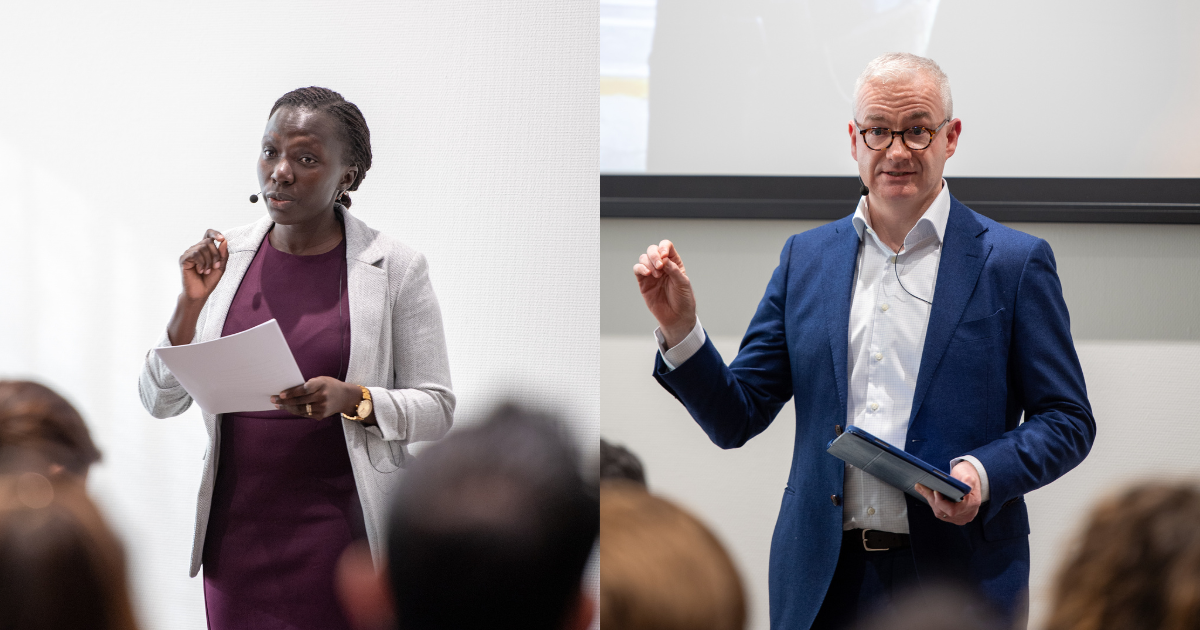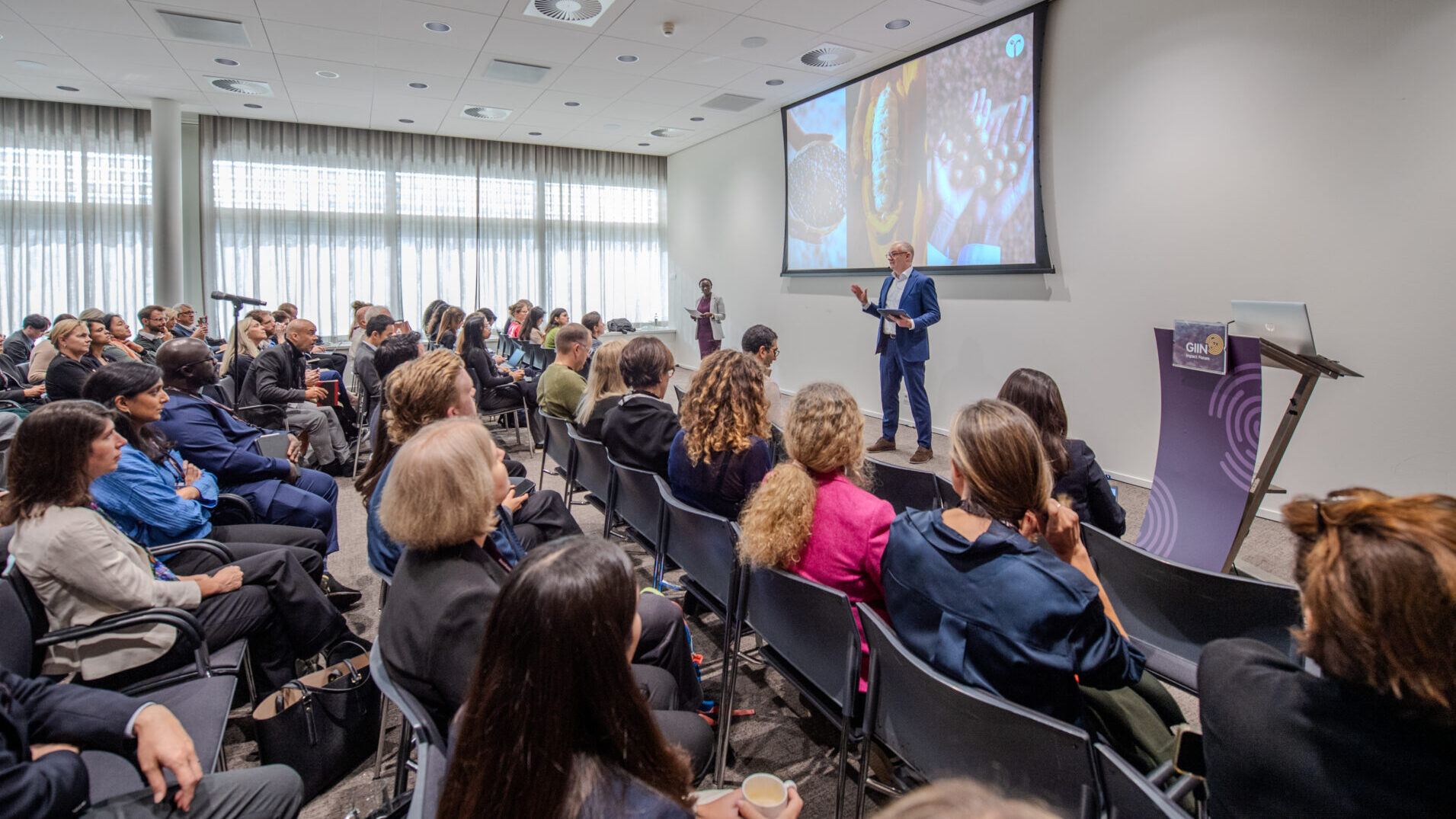
Root Capital’s Head of Advisory in Africa, Rose Ochieng (left) and Chief External Affairs Officer, Scott McDonald (right), share remarks at the 2024 Global Impact Investing Network Impact Forum. Photo credit: Global Impact Investing Network
“Far too often, smallholder farmers and the agricultural businesses they supply are marginalized by far-away decision makers. Their role as solutions-providers is diminished or ignored altogether. But there is some good news… the next few years can be a turning point, IF we work together to invest in proven solutions.” – Scott McDonald
Root Capital envisions a world where thousands of rural businesses support a thriving agricultural sector. The work needed to make this vision a reality is urgent, nuanced, and requires significant investments of both energy and capital.
At this year’s Global Impact Investing Network (GIIN) Impact Forum in Amsterdam, Root Capital’s Head of Advisory in Africa, Rose Ochieng, and Chief External Affairs Officer, Scott McDonald, together hosted a 30-minute talk entitled “Investing in Rural Resilience: Learnings from 25 Years of Impact” to a packed room. Drawing from case studies with a focus on our work in sub-Saharan Africa, this session explored how smallholder farmers and agricultural enterprises, with proper support, can act as engines of impact for their local communities.

A full room listens closely to Scott and Rose as they discuss Root Capital’s 25 years of impact. Photo credit: Global Impact Investing Network
Real-World Impact
To complement Scott’s big-picture description of our work and evolution, Rose then provided specific, real-world examples of the deep and measurable impact our clients have achieved due to their partnership with Root Capital:
Access to Finance: In 2005, Dukunde Kawa coffee cooperative in Rwanda, also known as Musasa, became Root Capital’s first client in Africa. Since its founding in 2004, Musasa has grown from 300 to nearly 1,200 members–among them many women who were widowed by the 1994 genocide. Root Capital has loaned them more than $5 million, and they have participated in over 65 advisory service training. The business has grown, recording nearly $1.5 million in sales in 2022, compared to $332,000 in 2006. Perhaps most excitingly, Musasa has expanded its operations to now include dairy processing, an area in which Root Capital has no involvement. The members and leadership of Musasa took the coffee-related tools and training from our partnership, and applied them to a new product, strengthening their business through diversification.
Climate Action: Many smallholder farmers lack access to expensive organic fertilizer, which is essential for soil health and crop productivity. In working towards a solution to this problem, in 2023 we partnered with a climate technology provider, Sistema.bio, on an innovative biodigester pilot involving two macadamia nut processing clients in Kenya. Sistema.bio manufactures and sells biodigester systems, which are prefabricated, modular containers that turn waste into biofertilizer and biogas which can be used for cooking or farm production activities. By utilizing environmentally-responsible solutions, our clients act as scaling agents for climate technology, influencing neighbors who can see the positive effects. Not only do biodigesters create a sustainable solution for dealing with waste, they also reduce greenhouse gas emissions while improving farmer livelihoods.
Gender Equity: Nova Coffee is a woman-led private company in Rwanda, owned and managed by Agnes Mukamushinja. Under Agnes’s leadership, Nova Coffee is committed to producing the best possible coffee and using it to transform the community. After purchasing the business in 2013, Agnes soon identified a need for formalized childcare, not just for her staff, but for the wider community. In 2020, Root Capital provided Nova with a gender equity resilience grant that they used to build an on-site early child care facility. This center includes offices, nursing rooms, playrooms, a library, and a kitchen. The next phase of the project will include outdoor playground facilities, as well as a basic health facility for primary care including vaccinations. Now, employees of Nova, as well as families from the wider community, can utilize this space for the care of their young children.
Next Generation Jobs: Bilha Wanjira Kirera is 24 years old and was born and raised in Kenya. After graduating university with a degree in agribusiness, Bilha accepted an internship with Limbua Group Limited through Root Capital’s talent partnership program. A client since 2018, Limbua is an agricultural enterprise in Embu that processes macadamia nuts, avocados, and mangos. As a climate change adaptation and mitigation intern at Limbua, Bilha assessed climate change risks at the grassroots level, offering training and resources to Limbua staff to curb the effects of the identified risks. Limbua was so impressed by Bilha’s energy and expertise, that after the year-long internship concluded, they offered her a full-time job as a Field Administrator, where she provides training to farmer members, teaching them climate-smart agricultural practices.
The Crucial Role of Agricultural Businesses
Ultimately, Scott and Rose made the case that agricultural businesses are one of the most effective, scalable, and impactful pathways to a just transition for resilient, climate-smart communities worldwide. To make this vision a reality, Root Capital needs support from the impact investment community to step up and fund these efforts. With scaled investment and continued collaboration, we believe that a thriving agricultural sector can be the backbone for a prosperous, inclusive, resilient and nature-positive future for millions of rural families.
Watch the full GIIN session, “Investing in Rural Resilience: Learning from 25 Years of Impact,” here.
